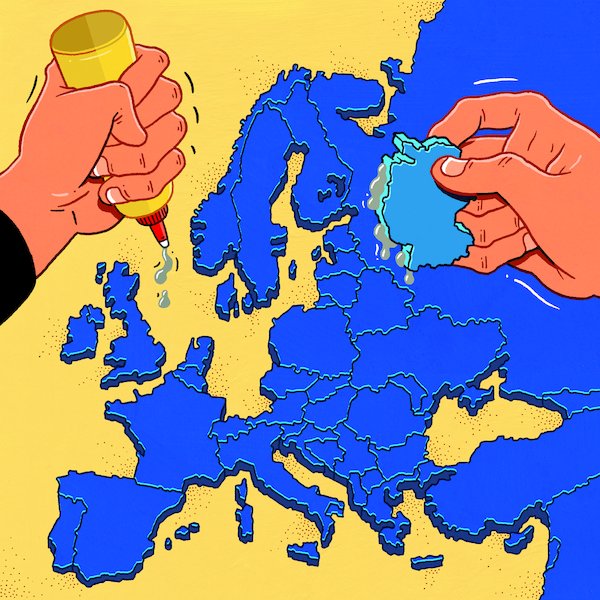BERLIN — After the horror in Brussels, Europe is mourning once more. Rightly, the states of the European Union are also focused on bringing the perpetrators to justice and preventing a follow-up attack. Cooperating more effectively on counterterrorism while tightening security at airports and train stations would be a start.
But we must not lose sight of the bigger picture. The Islamic State’s goal in Brussels was to scare us and drive a wedge between us, and it seems to be succeeding. Here in Germany, and across the Continent, right-wing, anti-immigration parties are calling for their nations to turn inward, away from one another. In Italy, the anti-immigrant Northern League wants an immediate closure of borders and mosques. The prime minister of Poland, Beata Szydlo, doubts that her nation of 40 million can meet its commitment to take in 400 refugees this year. Meanwhile, Nigel Farage, head of the UK Independence Party, suggests that the attacks prove that his country would be safer outside the European Union.
These appeals to emotion play into the terrorists’ hands just when what Europe must do is face its shared challenges with new unity at home, and a new readiness to act in the Middle East.
Within Europe, it is time for a comprehensive compromise, and my own country, Germany, should set the example. Germany cannot urge solidarity on the refugee question without giving ground on the economic and energy issues that divide the European Union. Concretely, that means accepting budget deficits that exceed European Union limits in countries like France and Italy that are suffering from high unemployment among the young. It also means re-evaluating plans to expand the Nord Stream pipeline system that runs from Russia to Germany, bypassing Poland and other eastern member states, who see in this a threat to their energy security. Only by making concessions in these areas can we create the basis for a compromise about refugee acceptance that includes fair distribution of asylum seekers throughout the European Union.
 Jasper Rietman
Jasper Rietman
As for the Middle East, it’s important not to conflate the question of how to treat the people fleeing war and terror in Syria, Iraq or Afghanistan with that of how to combat the radical militants who receive inspiration and training in those countries. And it’s important to remember that the Brussels attacks, like the attacks in Paris last November, appear to have been carried out by citizens of European countries. Defeating that internal threat requires reaching out to Muslim communities that feel marginalized, with too many young men who, seeing no prospects, fall victim to the siren song of jihadism.
Nevertheless, it is clear how directly events in the Middle East can affect our stability. Our disputes over how to treat asylum seekers are straining European unity as never before. And just as events in the Middle East are confronting Europe with enormous challenges to meet together, the region is becoming less vital for the United States. In The Atlantic last month, the journalist Jeffrey Goldberg reported that President Obama sees the Middle East as no longer terribly important to American interests and not amenable to America’s efforts to improve it, and therefore a place where America risks its credibility and power when its efforts lead to warfare and American deaths. That is an assessment shared by many Americans; it reflects long-term trends like America’s growing independence from Middle Eastern oil, the comparatively greater challenge posed by China’s rise and the increasing economic importance of Asia and Latin America.
So any assumption that the United States will take the lead on every issue is outdated. If Europeans are not prepared to take on more responsibility, the West may lose its ability to shape events in the Middle East.
How should Europeans adapt? How should we respond to this paradigm shift?
First, the European Union must be willing to commit more money to the region. We must improve conditions in refugee camps in countries like Jordan and Lebanon, where a euro goes about 30 times as far as it would in Germany. We must invest more in the region’s economic future, particularly in the young democracy of Tunisia. If young North Africans see stability and prosperity in their own communities, they are far less likely to feel pressed to emigrate.
Second, Europe needs a unified European Middle East policy that takes care of our own security. We have no lack of institutions. Rather, we suffer from a lack of will and a reluctance to discard antiquated notions of national prestige in foreign policy. Because individual member states so frequently act alone, our union of 500 million people punches below its weight. For example, a recent French proposal to restart Israeli-Palestinian peace talks, with the goal of a two-state solution, would have been stronger coming from the so-called E4+1, a grouping of France, Britain, Italy, Germany and the European Union’s high representative for foreign affairs.
This grouping needs to play a permanent role in Middle Eastern affairs. Its first order of business should be working with the United States to persuade Russia to forgo using its veto and allow the creation of humanitarian zones in Syria under a United Nations mandate. Since these zones will need military protection, Europe would then have to back up its diplomatic initiative by contributing troops to an international peacekeeping mission. Libya, too, requires more political and military engagement. European training and support for local moderate forces could make a vital contribution toward stemming chaos in a country just 300 miles from Italian soil.
Finally, the new reality demands that we preserve the validity of the trans-Atlantic partnership in the 21st century. More help from the United States on the refugee question — namely, accepting many more refugees — would be very welcome. At the same time, European politicians must tell their voters that, as the United States pivots away from the Middle East, Europe will have to bear a greater burden, because so much is at stake for us.
In the end, of course, Europe won’t be able to solve every problem alone. The United States will remain a major force in both the Middle East and Europe, and the West will need to work together to ensure common interests vital on both sides of the Atlantic — for example, that Iran sticks to the terms of the nuclear deal, and that a newly assertive Russia is restrained.
None of this will be easy, but I do not believe we have a choice. For the bombs that exploded in Belgium on March 22 were aimed not just at the people of Brussels, but at European unity and ideals. We cannot, and will not, allow terrorism to tear Europe apart.

